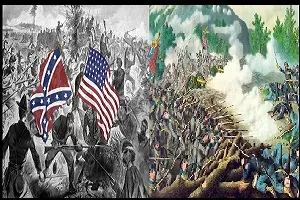The American Revolution stands as one of the most significant events in modern history. It wasn't just a rebellion against colonial British rule; it marked the beginning of profound changes in political, social, and economic thinking worldwide. Spanning from 1765 to 1783, this revolution heralded the birth of the United States as a sovereign nation founded on democratic principles.
Background
In the 18th century, tensions between the American colonies and the British government escalated. One of the key issues was the imposition of taxes by Britain on the colonies without direct representation. One particularly controversial measure was the Stamp Act of 1765, which imposed taxes on various official documents and publications in the colonies.
Triggers of Rebellion
Protests against tax policies and grievances over political injustices reached a boiling point, triggering a series of events leading the colonies toward rebellion. Key events such as the Boston Tea Party in 1773, involving the dumping of tea cargoes from British ships by protesters in Boston, Massachusetts, served as catalysts that inflamed the spirit of resistance.
War for Independence
In 1775, clashes between colonial forces and British troops erupted in Lexington and Concord, marking the onset of the American Revolutionary War. While initially some colonial leaders like George Washington hesitated to pursue full independence, the spirit of resistance continued to intensify.
Declaration of Independence
On July 4, 1776, the Continental Congress of America signed the Declaration of Independence, a document drafted by Thomas Jefferson declaring that the American colonies were no longer subject to British rule and had become independent and sovereign states.
War and the Formation of a New Nation
The War for Independence continued for several more years, with American forces aided by allies such as France, successfully defeating Britain by 1783. With the signing of the Treaty of Paris on September 3, 1783, Britain officially recognized the independence of the United States.
Legacy of the American Revolution
The American Revolution not only resulted in a new nation but also gave rise to new ideas about democracy, freedom, and human rights. Documents like the Declaration of Independence and the United States Constitution laid the foundation for the development of democratic governance worldwide. The revolution also sparked debates on issues such as slavery, women's rights, and minority rights, which later became focal points of ongoing struggles and change in the United States.
Facts about the American Civil War
Facts about the American Civil War, among others:
1. War Dates
The American Civil War took place between 1861 and 1865. It was an armed conflict that occurred in the United States between states supporting secession from the Union (Confederacy) and states remaining loyal to the Union.
2. Causes
The main causes of the Civil War were differences in views on slavery and the rights of states versus the federal government. Confederate states, mostly located in the South, wanted to maintain the practice of slavery, while Northern states opposed it.
3. Peak of the War
The peak of the war occurred during the Battle of Gettysburg in 1863. This battle was one of the largest and bloodiest in American history, with casualties exceeding 50,000 from both sides.
4. Abraham Lincoln
The President of the United States at the time, Abraham Lincoln, led the country through the war. He strongly opposed slavery and was determined to preserve the nation's unity. The abolition of slavery was announced by him through the Emancipation Proclamation in 1863.
5. End of the War
The war ended with the surrender of the Confederacy on April 9, 1865, after General Robert E. Lee surrendered his troops to Union General Ulysses S. Grant at Appomattox Court House, Virginia.
6. Impact
The Civil War had wide-ranging and long-term impacts on the United States. Besides ending slavery, it also consolidated federal power over the states, reshaping the country's political, economic, and social direction, and increasing awareness of civil rights.
7. Casualties
The American Civil War was one of the deadliest conflicts in U.S. history. It is estimated that around 620,000 to 750,000 lives were lost due to the war, both from battles and from diseases and starvation that ravaged both sides.
Conclusion
The American Revolution was a pivotal turning point in modern world history. Through determined struggle, the American colonies achieved independence from colonial rule and formed a nation based on principles of democracy and freedom. The legacy of this revolution is still felt today, not only in the United States but also worldwide.
That is the article entitled Getting to Know the Statue of Liberty. If there are any deficiencies or errors in writing this article, the Berbagai Reviews expresses its deepest apologies. Please leave a wise message in the comments column provided. Thank you for visiting, hopefully it's useful.
Other reading materials, can help with school assignments, click Pustaka Pengetahuan
To increase insight and knowledge, please click Baraja Farm
For tutorial on how to cultivate, please click Baraja Farm Channel
Social media please click facebook




Tidak ada komentar:
Posting Komentar